Starlink Talks 10Gbps Speed as it Adds Lasers to New Satellites

The latest crop of Low Earth Orbit (LEO) Starlink broadband satellites include the long-awaited “laser links between the satellites” feature, which could boost the constellation’s coverage and reliability. On top of that the company has hinted that staggering speeds of 10Gbps may in the future be possible for individual users.
After the latest launch SpaceX now has 1,023 LEOs in orbit and their initial ambition is to deploy a total of 4,425 by 2024, which could potentially be followed by up to 12,000 at a later date (possibly late 2026). As a result, the company now has enough LEOs to start a limited commercial service and a growing number of people in the USA, Canada and UK have already joined their “Better Than Nothing Beta” programme.
Early beta customers are generally being told to expect broadband speeds of 50-150Mbps and unlimited data, while the hardware (dish, terminal, router etc.) tends to cost £439 (vs $499 in the USA), then £54 for shipping and £89 (vs $99 in the USA) for the monthly subscription. So it’s not cheap, but if you live in a remote rural area then that could still be attractive and we hope that their final product includes a cheaper tier (possibly at the cost of some speed).
Advertisement
However, the CEO of SpaceX, Elon Musk, also confirmed another important development with the latest batch of Starlinks (sitting at an altitude of 560km): “These also have laser links between the satellites, so no ground stations are needed over the poles” (i.e. north pole, south pole or Antarctica etc.). Indeed SpaceX confirmed that the satellites they launched last Sunday “will be the first in the constellation to deploy to a polar orbit.”
You can just about see the laser module in the image, which looks a bit like a black pipe object that’s acting as a covering at the end (bottom of the image, where the flat Starlinks are all stacked). “All [our] satellites launched next year will have laser links. Only our polar satellites have lasers this year & are v0.9,” added Musk.
Inter-Satellite laser links have long been a part of the plan, but this is the first time we’ve seen the technology being added (outside of a trial) to their commercial constellation and thus a ground station doesn’t need to be in the same footprint as user terminals. But there’s also been another interesting development to report.
The Space Reporter for CNBC, Michael Sheetz, recently posted what looks to be a slide from one of SpaceX’s presentations (here), where it clearly states that the current download speed of c.100Mbps will in the “future” reach 10Gbps to a user. At present we don’t know anything about when or quite how this will be achieved, since the existing crop of Starlinks aren’t really setup to handle that sort of capacity for individual users. Equally by ‘user’ they don’t necessarily mean in the residential market (time will tell).
Advertisement
Mark is a professional technology writer, IT consultant and computer engineer from Dorset (England), he also founded ISPreview in 1999 and enjoys analysing the latest telecoms and broadband developments. Find me on X (Twitter), Mastodon, Facebook, BlueSky, Threads.net and Linkedin.
« ISP Origin Broadband Preps UK Price Hikes for March 2021







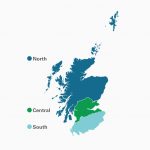

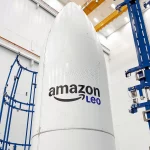
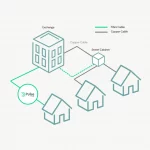

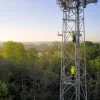
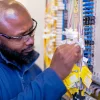







































It’ll be tough for OneWeb to compete. I hope Amazon buys them so that no one is laid off.
what would be better is it Elon just bought one-web completely. A joint Amazon/starlink venture would be best for everyone, but something tells me that’d never happen! 🙂
yeah go america, america number one …
sigh
> what would be better is it Elon just bought one-web completely.
Just like when Sky bought BSB – that’ll definitely be good for competition.
As he has a brain, I seriously doubt Bezos would waste a single penny on OneWeb. If there’s any IP or there’re are any staff who Bezos (or Musk) desire, better simply wait for OneWeb’s next bankruptcy and/or just poach the staff they desire.
@NE555
I wouldn’t compare OneWeb to BSB, rather to ONdigital.
BSB perhaps could have survived as a going concern had it not merged with SKY.
Whereas ONdigital was doomed from the get-go.
Ondigital failed because Rupert Murdoch’s NDS group hacked them and published the codes online via Lee Gibbling’s Thoic.com. An entire industry conspired to bring them down so sky could win. Not even allegedly, there was an entire dispatches documentary about it called “Murdoch’s pirates”
Ondigital/ITV digital did not fail “from the get go” they failed because the competition conspired to take them out.
@ray adams. It will not be the conspiracy of others that brings OneWeb down again, but the commercial forces of competition and limited resources.
What competition? Its not like there is any in the broadband market anyway.
If Britain used it own talent instead of snuffing it out so spoilt kids get the best jobs Britain would not be run by arseholes. Like from when thatcher let them out!